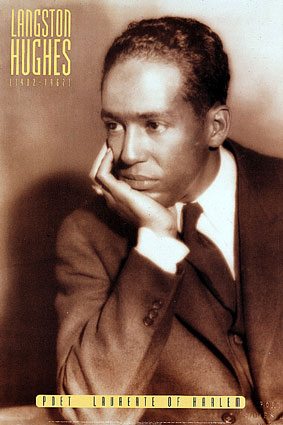Many modernist writers used language in new and different ways. The rush of immigrants to America definitely added to the variations and colorfulness of language. Even though the creative writing and memoir poetry of immigrant voices in America has only recently started to become a prominent part of the canon of modern American literature, it still had a distinct and admitted influence on many writers. As we study the work of the traditional American canon of writers, we can no longer avoid looking at the inspiration behind some of their work. Eastern thought in American literature is obvious in writer’s work like Walt Whitman or David Thoreau. Perhaps some of these writers were even encouraged by the Angel Island poets to apply various techniques to writing in order to “make it new” as Ezra Pound said. Certainly the laments of the Angel Island poets show a universal connection with language as theme.
Those themes show prominently in Langston Hughes poem the “Negro Speaks of Rivers.” The language is used as a way to evoke a culture, to show how language can communicate pain, sadness, loss, but also hope and connection to the world. The attitude of the poem towards language shows that Hughes was deeply aware of the power of language in terms of how it related to his culture. He manipulates line length and metaphor to substantiate his own experience and to describe the collective experience of African American slavery and the poem is a call to his race to not only rise above, but to hold firm to the foundations of the past, to call on the strength and rich heritage of the ancestors.
In “Corrido de los Desarraigados/Corridor of the Uprooted Ones” language again is used to evoke a sense of loss, sadness and yet hope. The repetition of certain lines is a way for the speaker of the poem to communicate the injustice of coming to a place to work and being called “a bandit“ (50) and to express the hurt associated with the cruelty of some of the Americans they encountered (38-39).
In the Angel Island poem, “Leaving behind my writing brush and” the speaker of the poem declares that if he ever becomes successful in America he will “spare not a single blade of grass” (8). This tendency to employ nature images in eastern poetry is prevalent, but using it to evoke violence is both a call for retribution while at the same time paying homage to the language of typical Asian poetry.
In all three of the poems it is hard to imagine that the speaker is all that much different than the poet, the persona does not seem to be an act, but rather a deeply seated memory, even though the works also speak for a people, a place and time. Furthermore, the imagery in the poems all contribute as well to the sense of loss, anger, dislocation, and sadness.
There are images of tears, blood, and rivers and even a promise of murder — that are all used to establish a mood of angst and a sense of betrayal on the part of the speakers of the poems who all seem to feel that America has ultimately let them down for various reasons.
The language the speakers use in the poems is therefore that much more poignant because it recalls for them, and for the reader that these speakers, while not able to find a sense of belonging, let alone the sense of accomplishment or autonomy they sought, were adrift in an uncaring world, but also at the same time connected and deeply rooted, to a cultural place and time.
Hughes is using several different literary techniques in the passage “I’ve known rivers ancient as the world and older than the flow of human blood in human veins” in his poem “The Negro Speaks of Rivers.” The techniques include repetition, metaphor and line variation.
By using the repetition of the word “human,” Hughes is able to create a rhythm and a flow, much like a river. He also uses the words, “ancient” and “old.” They are synonyms of each other in this poem, creating a link in the reader’s mind that somehow the speaker of the poem (the “Negro”) is as continuous as the river itself and that the Negro has access to knowledge and history as naturally as the river does.
The Negro in this poem, like the river, is permanent and permeating, a life giving force with something to offer the world. Interestingly, a river is not silent as it makes its way through the land it, it is not useless, being stocked with fish, and of course water itself being necessary to all life on the planet. Hughes by using language to compare the “Negro” to the river is to show that, like the River, the “Negro” is necessary, eternal, viable. He also uses the imagery as flesh and blood.
In the poem rivers are veins; that the blood of the people are in the rivers and that the rivers are in the blood of the people, shows a connection to a heritage much older and richer than that put upon the African Americans by the Americans.
The river does seem to take on a vein-like quality, spreading out over the earth, much like veins spread out over the human body. Another thing Hughes does with this poem is to intentionally run the words of the poem to the edge of the page.
While it may not be immediately obvious, this line is edited in such a way as to sow that the original length of the line went to the edge of the page; this is using a literary technique of line variation to actually show that the poem itself is like a river, flowing and meandering on the page, like a river flows and meanders on the earth.
Overall, Hughes uses many literary devices in this passage to illustrate the multiple levels of the idea of language as theme.and also as a way to claim birthright, to declare the speaker’s belief that they belonged.
In “Corrido de los Desarraigados/Corridor of the Uprooted Ones” language, again, is used to evoke a sense of loss, sadness and yet hope. A hope to return someday to the lush and beautiful Mexico of the speaker’s remembered past (4).
In the “Corridor of the Uprooted Ones” the speaker’s mother laments the train as hateful (26-28) and this idea of movement evokes a sense of loss, that moving away from the homeland is cause for pain.
Much of the modernist immigrant poetry evokes a deep mistrust of the American.
There is a sense of hurt feelings, of being misunderstood, for being marginalized for no good reason, there seems to be that deep need to be accepted or at least recognized as valuable and yet consistently the image of the speaker of the immigrant poem, whether Asian, African American, or Mexican is one of a downtrodden, exceptionally angry, disenfranchised individual.
In the poem “Leaving behind my writing brush and” the speaker is defiant in his language, expressing a deep-seated lament that in America he is seen as uneducated, but the idea here is that the speaker of the poem, in his own country is a respected intellectual. The writing brush is in fact symbolic of learnedness.
“Leaving behind my writing brush and /removing my sword, I came to America” is the first and second line of the poem and is laid out in such a way as to show that coming to America is not a gain but a loss.
This is done by switching the way the two independent clauses of the sentence from how they would typically be laid out which would be “I came to America” being first and “leaving behind” second. When considering that the immigrant poetry of the modernist era, language plays a instrumental role in connection with the heritage of a people who are displaced.
The line “Who was to know two streams of tears would flow upon arriving here?” employs the literary device of symbolism and reveals the theme of language as being an integral part to the understanding of the immigrant experience in terms of communicating the meaning of the poem.
And again, like the Hughes poem we have the universal symbolism of moving water and how that evokes not only a sense of sadness but also a sense that the speaker of the poem is crying out to be noticed as an individual. The threat of violence in the last two lines of this poem come from a sense of frustration at not being recognized as being valuable or viable to the Americans.
In all three of the poems there is an undeniable desire on the part of the speaker to feel a sense of connection. Since each of the speakers are far from home, and all dealing with prejudice, racist attitudes they feel they must somehow remind themselves of where they come from.
By using the language and rhythms, imagery and symbolism of their homelands they evoke a sense of belonging even though they clearly are outsiders who are angry at being marginalized by people who are ethnocentric. The diverse languages of the ethnic immigrant groups in America all suggest and bring to mind the rich, cultural heritage they have left behind. It gives to them a sense that even though they are stranded in America, strands still attach them to home.




